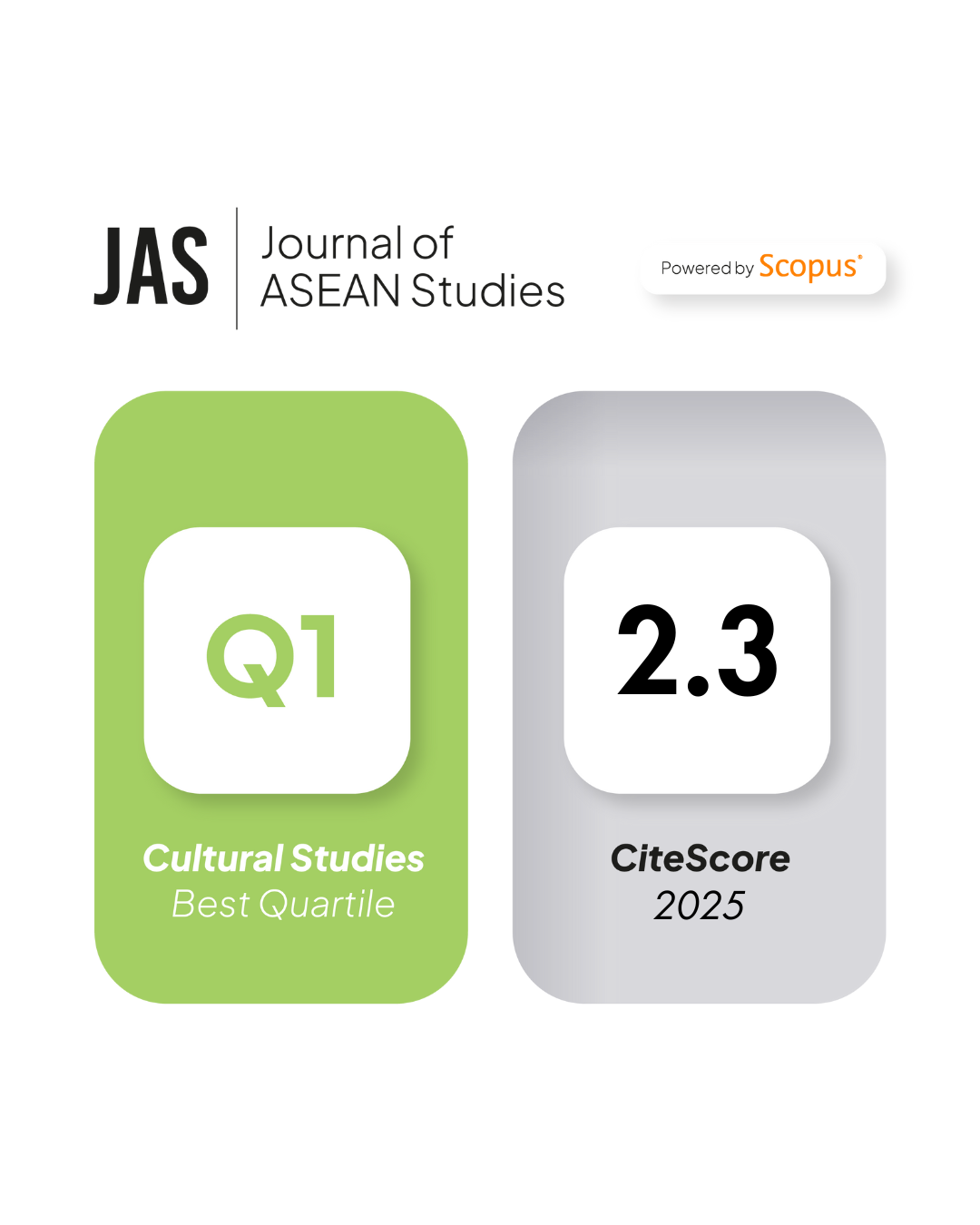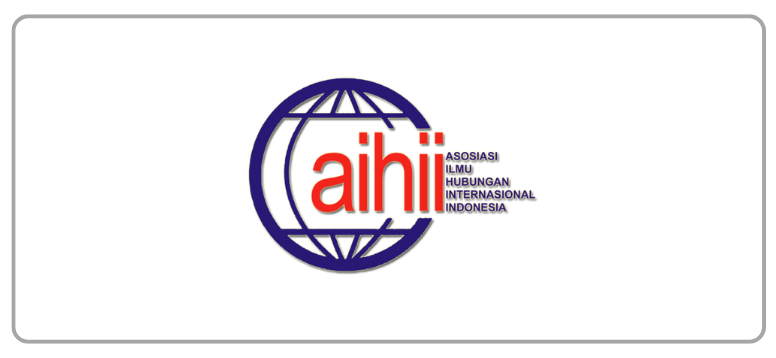What’s Wrong with us? an Analysis of Indonesian President Joko Widodo’s Public Speeches from 2017 to 2018
DOI:
https://doi.org/10.21512/jas.v9i2.7318Keywords:
presidential speechmaking, political rhetoric, truth-telling, Indonesia, JokowiAbstract
The research examines the rhetorical style and political priorities in Indonesian President Joko Widodo’s public speeches during his first term in office. Content analysis is used to investigate a purposive sample of 66 presidential speeches from May 2017 to May 2018. In addition, the research identifies the similarity of words to understand the selective appraisal of Indonesia’s progress based on President Jokowi’s utterances. In one contentious oration on May 18th, 2017, delivered to government officials, the president bluntly asked ‘what’s wrong with us’? The question presupposes that something is wrong in Indonesian politics, and is narrowcast to an audience of government officials, some of whom are implicated in the developmental shortcomings, administrative inefficiencies, and social conflicts that persist in Indonesia today. The president’s strategic message implies that Indonesia’s economic development unduly lags regional competitors; disinformation and hate speech create social divisions and political distortions; and there is a significant digital and technological divide in the country. The research result shows that the president’s passion extends beyond bureaucratic reform and into contentious political topics, where selective attempts at disruptive truth-telling are made.
References
Agustin, D. (2017, May 10). Ini 7 rangkaian aksi bela Islam sebelum Ahok divonis 2 tahun penjara. Republika. https://www.republika.co.id/berita/nasional/hukum/17/05/10/opp5r4330-ini-7-rangkaian-aksi-bela-islam-sebelum-ahok-divonis-2-tahun-penjara
Aspinall, E. & Mietzner, M. (2014). Indonesian politics in 2014: Democracy’s close call. Bulletin of Indonesian Economic Studies, 50(3), 347–369. https://doi.org/10.1080/00074918.2014.980375
Bland, B. (2020). Man of Contradictions: Joko Widodo and the Struggle to Remake Indonesia. Victoria: Penguin Random House.
Bramley, N. R. (2001). Pronouns of politics: The use of pronouns in the construction of ‘self’ and ‘other’ in political interviews. (Unpublished PhD Thesis). Australian National University.
Brancati, D. (2018). Social Scientific Research. London: SAGE Publications Ltd.
Callahan, W. A. (2010). China: The Pessoptimist Nation. Oxford: Oxford University Press.
Cohen, J. E. (1995). Presidential rhetoric and the public agenda. American Journal of Political Science, 39(1), 87–107. https://doi.org/10.2307/2111759
Centre for Strategic and International Studies (CSIS). (2017). 3 Tahun Jokowi: Kenaikan Elektoral & Kepuasan Publik. Jakarta: Centre for Strategic and International Studies.
Das, K., Tamhane, T., Vatterott, B., Wibowo, P., & Wintels, S. (2018, August 28). The digital archipelago: How online commerce is driving Indonesia’s economic development. McKinsey & Company. https://www.mckinsey.com/featured-insights/asia-pacific/the-digital-archipelago-how-online-commerce-is-driving-Indonesias-economic-development
Dey, P. & Mason, C. (2018). Overcoming constraints of collective imagination: An inquiry into activist entrepreneuring, disruptive truth-telling and the creation of ‘possible worlds’. Journal of Business Venturing, 33(1), 84–99. https://doi.org/10.1016/j.jbusvent.2017.11.002
Duncan, C. R. (2005). The other Maluku: Chronologies of conflict in North Maluku. Indonesia, 80, 53–80. https://www.jstor.org/stable/3351319
Fealy, G. (2020). Jokowi in the COVID-19 era: Repressive pluralism, dynasticism and the overbearing state. Bulletin of Indonesian Economic Studies, 56(3), 301–323. https://doi.org/10.1080/00074918.2020.1846482
Hatherell, M. (2014). Repertoires of representation and an application to Indonesia’s Jokowi. Representation, 50(4), 439–451. https://doi.org/10.1080/00344893.2014.980311
Hiariej, E. O. S. (2017, May 08). DPR Versus KPK. Kompas. https://nasional.kompas.com/read/2017/05/08/16582571/dpr.versus.kpk
High-technology exports (current US$). (n.d). World Bank. https://data.worldbank.org/indicator/TX.VAL.TECH.CD?contextual=default&end=2015&locations=ID-VN-KR-MY&start=1988&view=chart
Jung, M-H. (2017, August 02). DSME exports submarine named ‘Nagapasa’ for first time in Korea. Business Korea. http://www.businesskorea.co.kr/news/articleView.html?idxno=18853
Kyung-Sup, C. (2016). Compressed modernity in South Korea: Constitutive dimensions, manifesting units, and historical conditions. In Youna Kim (Eds.), Routledge Handbook of Korean Culture and Society (pp. 31–47). London: Routledge.
Lim, M. (2017). Freedom to hate: Social media, algorithmic enclaves, and the rise of tribal nationalism in Indonesia. Critical Asian Studies, 49(3), 411–427. https://doi.org/10.1080/14672715.2017.1341188
Madkur, A. (2018). A text analysis on President Joko Widodo’s speech at APEC CEO Summit Asian Pacific. Pedagogy: Journal of English Language Teaching, 6(1), 11–22. https://doi.org/10.32332/pedagogy.v6i1.1113
McLeod, R. H. & Rosdaniah, S. (2018). An evaluation of some key economic policies. Bulletin of Indonesian Economic Studies, 54(3), 279–306. https://doi.org/10.1080/00074918.2018.1548245
Mietzner, M. (2017). Indonesia in 2016: Jokowi’s Presidency between elite consolidation and extra-parliamentary opposition. Asian Survey, 57(1), 165–172. https://doi.org/10.1525/as.2017.57.1.165
Nainggolan, P. P. (2015). Kebijakan poros maritim dunia Joko Widodo dan implikasi Internasionalnya. Jurnal Politika, 6(2), 167–190.
Nurpadillah, V. (2017). Wacana kepemimpinan: Analisis makna konotasi dalam teks pidato perdana Presiden Jokowi. Jalabahasa, 13(1), 83–92. https://doi.org/10.36567/jalabahasa.v13i1.43
Ott, B. L. (2017). The age of Twitter: Donald J. Trump and the politics of debasement. Critical Studies in Media Communication, 34(1), 59–68. https://doi.org/10.1080/15295036.2016.1266686
Produk unggulan Indonesia. (n.d.). Ministry of Trade. http://ppei.kemendag.go.id/produk-unggulan-indonesia/
Puspitasari, L. & Ishii, K. (2016). Digital divides and mobile internet in Indonesia: Impact of smartphones. Telematics and Informatics, 33(2), 472–482. http://dx.doi.org/10.1016/j.tele.2015.11.001
Ray, D. & Ing, L. Y. (2016). Addressing Indonesia’s infrastructure deficit. Bulletin of Indonesian Economic Studies, 52(1), 1–25. https://doi.org/10.1080/00074918.2016.1162266
Rhee, J-C. (2005). The market’s revolt in the dilemma between weak market capabilities and weak state capacities: The Korean case of corporate restructuring. Pacific Focus, 20(2), 241–275. http://doi.org/10.1111/j.1976-5118.2005.tb00293.x
Sani, A. F. I. (2018, October 24). Jokowi: Esemka car production not government’s responsibility. Tempo. http://en.tempo.co/read/922831/jokowi-esemka-car-production-not-governments-responsibility/full&view=ok
Shaw, K. (2017). Beyond the bully pulpit: Presidential speeches in the Courts. Texas Law Review, 96(1), 71–140. https://ssrn.com/abstract=2981475
Shekhar, V. & Liow, J. C. (2014, November 07). Indonesia as a maritime power: Jokowi’s vision, strategies, and obstacles ahead. Brookings. https://www.brookings.edu/articles/indonesia-as-a-maritime-power-jokowis-vision-strategies-and-obstacles-ahead/
Siddiq, A. A., Hidayat, D. N., Alek, & Adrefiza. (2021). A text analysis on Joko Widodo’s speech text on Indonesia’s Independence Day. Linguistic, English Education and Art (LEEA) Journal, 4(2), 270–284. https://doi.org/10.31539/leea.v4i2.1708
Sihombing, L. B., Latief, Y., Rarasati, A. D., & Wibowo, A. (2018). Project financing models for toll road investments: A state-of-the-art literature review. Civil Engineering and Architecture, 6(3), 115–127. https://doi.org/10.13189/cea.2018.060301
Sumarsono, H. R. (2016). Mengkritisi Aporisma Orang Jawa. Bekasi: Media Maxima.
Susetyo, D. P. B., Widiyatmadi, H. M. E., & Sudiantara, Y. (2014) Konsep self dan penghayatan self orang Jawa. Psikodimensia, 13(1), 47–59. https://doi.org/10.24167/psiko.v13i1.277
Tapsell, R. (2015). Indonesia’s media oligarchy and the ‘Jokowi Phenomenon’. Indonesia, 99, 29–50. http://dx.doi.org/10.5728/indonesia.99.0029
Tomsa, D. (2017). Indonesia in 2016: Jokowi consolidates power. Southeast Asian Affairs, 149–162. https://muse.jhu.edu/article/658018
Tyson, A. (2021). Blasphemy and judicial legitimacy in Indonesia. Politics and Religion, 14(1), 182–205.
Tyson, A. & Purnomo, B. (2017). President Jokowi and the 2014 Obor Rakyat controversy in Indonesia. Critical Asian Studies, 49(1), 117–136. https://doi.org/10.1080/14672715.2016.1258585
Utomo, Y. W. (2016, September 15). Dana riset jadi 0,2 persen PDB, tetapi cuma karena perubahan rumus penghitungan. Kompas. https://sains.kompas.com/read/2016/09/15/20481681/dana.riset.jadi.0.2.persen.pdb.tetapi.cuma.karena.perubahan.rumus.penghitungan
Wadipalapa, R. P. (2020, September 29). Fabrikasi ingatan enam lima. Tempo. https://koran.tempo.co/read/opini/458303/opini-fabrikasi-ingatan-enam-lima-oleh-rendy-pahrun-wadipalapa
Warburton, E. (2016). Jokowi and the new developmentalism. Bulletin of Indonesian Economic Studies, 52(3), 297–320. https://doi.org/10.1080/00074918.2016.1249262
Worstall, T. (2017, August 16). Joko Widodo is in error here: Its more development Indonesia needs, not equality of poverty. Forbes. https://www.forbes.com/sites/timworstall/2017/08/16/jokowi-widodo-is-in-error-here-its-more-development-indonesia-needs-not-equality-of-poverty/#48064e054e80
Downloads
Published
How to Cite
Issue
Section
License
Copyright (c) 2021 Adam Tyson, Stanislaus Apresian

This work is licensed under a Creative Commons Attribution-NonCommercial 4.0 International License.


























